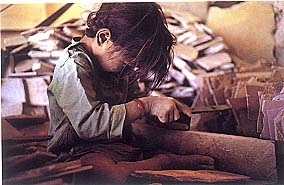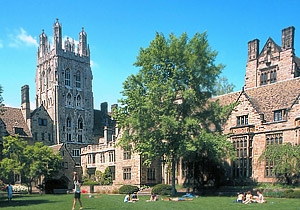Before I read Girl in Translation, my definition of a hero would have been someone that saves lives, wears a cape, and has an awesome body (Superman). After reading it, my definition has changed quite a bit. A hero is someone that is brave, selfless, dedicated, and courageous. A hero goes above and beyond what is expected of them in order to help those in need. A common stereotype might be firefighters or policemen, but many everyday, normal people possess the characteristics of a hero.
I think having a hero is important. Having someone to aspire to be like might get you farther in life, and make you a better person in the end. Having someone to look up to might be what gets you through the day, or causes you to change some of the bad things about you.
 |
| A kid working in a Chinese sweatshop. (http://www.stylesalad.com/2011/03/youre-being-fooled/) |
Kimberly Chang is the character in Girl in Translation that portrays qualities of a hero. These qualities are evident in situations that happen throughout the book. The first example is the condition Kim and her mom live in when they first move to Brooklyn. They live in a two room apartment with no heat, broken windows with garbage bags taped over them, roaches and mice. Kimberly described that the unheated apartment was so cold, “a thick sheet of ice formed over the windows, and the toilet water froze” (Kwok 267). They lived like this for seven years. This shows that she is courageous. She was scared of the bad living conditions, but she stuck it out. The second example is she worked at her aunt's factory for the same seven years they lived in the house. The working conditions in the factory were horrible. “The heat enveloped around you like a fist, the sound of the machines was deafening, and the air was heavy and tasted of metal” (Kwok 41). She never gave up at the factory no matter how bad the conditions. This shows she is dedicated. The third way is even though she worked at the factory, she still had to go to school. She was an excellent student, and things were hard when she first moved to America because she could barely speak English. She started to do better, and ended up making it into Yale with full financial aid. This shows that she goes above and beyond what is expected of her. The final way is she put up with her Aunt Paula for seven years. Kim and her mom let Paula treat them like dirt, but finally, Kim stood up for her and her mom. She said to her aunt, “You have faked your kindness and politeness towards us. You've never shown us niceness. You should feel bad for leaving us in that apartment, and making us work in this environment” (Kwok 320). She then threatens, “If you trouble us at all, I will call the police” (Kwok 321). Standing up to her aunt shows she is brave. All of these examples show her heroic qualities.
 |
| Yale University building (http://www.cvent.com/en/destination-guide/new-haven/yale-university-tours.shtml) |
Kimberly Chang should be inducted into a Hero Hall of Fame. She has shown many heroic characteristics. She is nice to everyone around her, and she puts others first. She always put her mom before herself, and worked as hard as she could in the factory to help make money. She rarely asked anything of her mother. Kimberly was brave, and never gave up. She stuck it out through the horrible working and living conditions, and hardly complained. She doesn't care about materialistic things, or what other people think of her. She always tries to be the best person she can be. Kimberly Chang deserves a spot in a Hero Hall of Fame.
Q&A
#1. Q-Who is your hero, and why?
A- My hero is Albert Einstein. He made many achievements in the physics field. Math and science are my best classes, so I look to him as a role model.
#2. Q- Do you look to your mom as a role model? If so, how?
A- I do look to my mom as a role model. She never loses hope and never gives up. She's always respectful to others. That's the kind of person I want to be like.
#3. Q- Growing up in poverty, how did you become the positive person you are today?
A- In those types of situations you have to stay strong. I tried to never have a negative attitude, and make the best out of the situation. I also went to temple and prayed to the gods for help.
#4. Q- Do you think it's important for poverty stricken kids to have role models?
A- I think it's important for all kids to have role models. Kids are our future. They need to have someone inspiring to look up to, so that they'll be successful, good people later in life.
#5. Q- Were any of your teachers heroes or role models to you?
A- Mr. Jamali was the teacher that was the biggest role model for me. He helped me in the library and gave me free books on things I was interested in. He let me stay extra hours in the library so I could make more money working there. He was one of my nicest teachers.
#6. Q- What was it like growing up without a father to be a role model for you?
A- I don't know what it would be like growing up with a father as a role model, so not having one around was normal for me. I often wonder what it would've been like with him there, but I think my mom and I did just fine on our own.
#7. Q- How great of an impact did your hero have on your life?
A- My hero, Albert Einstein, has had a huge impact on my life. He made great discoveries in physics, and I wanted to make great discoveries like that, so my interest in math and science kept growing. He has inspired me to accomplish my dreams of becoming a pediatric surgeon.
#8. Q- How did you push yourself to work in the factory everyday?
A- I just told myself it'd be over eventually, and if I didn't work, we wouldn't have any money and we'd get thrown on the streets. My mom and I couldn't have that happen.
#9. Q- Do you think everyone's role model has a big effect on the person they become?
A- Yes, I do. Your role model is someone you look up to and want to be like. If you want to be like that person, then you will.
#10. Q- Who helped you the most to get where you are today?
A- My mom helped me the most. She never stopped believing in me, and always pushed me to be the best I could be.
Page created on 4/7/2011 3:26:10 PM
Last edited 4/7/2011 3:26:10 PM
